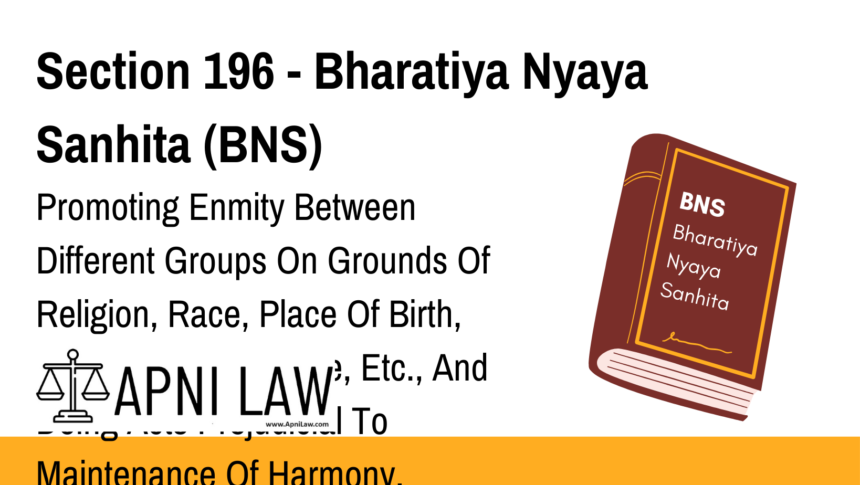Code: Section 196 BNS
(1) Whoever—
(a) by words, either spoken or written, or by signs or by visible representations
or through electronic communication or otherwise, promotes or attempts to promote,
on grounds of religion, race, place of birth, residence, language, caste or community or
any other ground whatsoever, disharmony or feelings of enmity, hatred or ill-will
between different religious, racial, language or regional groups or castes or
communities; or
(b) commits any act which is prejudicial to the maintenance of harmony between
different religious, racial, language or regional groups or castes or communities, and
which disturbs or is likely to disturb the public tranquillity; or
(c) organises any exercise, movement, drill or other similar activity intending that
the participants in such activity shall use or be trained to use criminal force or violence
or knowing it to be likely that the participants in such activity will use or be trained to
use criminal force or violence, or participates in such activity intending to use or be
trained to use criminal force or violence or knowing it to be likely that the participants
in such activity will use or be trained to use criminal force or violence, against any
religious, racial, language or regional group or caste or community and such activity
for any reason whatsoever causes or is likely to cause fear or alarm or a feeling of
insecurity amongst members of such religious, racial, language or regional group or
caste or community,
shall be punished with imprisonment which may extend to three years, or with fine, or with
both.
(2) Whoever commits an offence specified in sub-section (1) in any place of worship
or in any assembly engaged in the performance of religious worship or religious ceremonies,
shall be punished with imprisonment which may extend to five years and shall also be liable
to fine.
Explanation of Section 196 BNS
Section 196 of the Bharatiya Nyaya Sanhita (BNS), 2023, deals with promoting enmity between different groups based on religion, race, language, caste, place of birth, or community. This section aims to prevent communal disharmony, hate speech, and actions that threaten social unity.
Key Elements of Section 196 BNS
- Modes of Offence:
- Spoken or written words
- Signs, symbols, or gestures
- Visible representations (posters, cartoons, social media posts, etc.)
- Any other means of spreading enmity
- Punishment Classification:
- Basic offence → Up to 3 years imprisonment or fine, or both
- If it disturbs public order or incites violence → Up to 5 years imprisonment + fine (mandatory)
- Protected Interests:
- Religious and communal harmony
- Social peace and public order
- Prevention of hate speech and divisive propaganda
Illustration of Section 196 BNS
Example 1: Hate Speech in a Public Rally
A political leader delivers a speech blaming a particular religious community for economic problems, leading to riots and public violence. Since the act resulted in public disorder, it falls under Section 196(2) BNS, attracting up to 5 years imprisonment and fine.
Example 2: Spreading Hate on Social Media
A person posts misleading content about a specific linguistic group, claiming they are responsible for crimes in a city, causing tensions and protests. This act qualifies as an offence under Section 196(1) BNS, with punishment up to 3 years imprisonment.
Common Questions and Answers on Section 196 BNS
1. What is the difference between Section 196(1) and Section 196(2) BNS?
- Answer:
- Section 196(1) applies when enmity is promoted without direct violence.
- Section 196(2) applies if public peace is disturbed or violence occurs as a result.
2. Is Section 196 BNS a cognizable offence?
- Answer: Yes, an offence under Section 196(2) BNS (where violence is caused) is cognizable, meaning the police can arrest without prior court approval. However, Section 196(1) BNS (promotion of enmity without violence) may require court permission.
3. Is Section 196 BNS a bailable offence?
- Answer:
- Section 196(1) BNS (promotion of enmity without violence) is bailable.
- Section 196(2) BNS (if violence occurs) is non-bailable.
4. Can Section 196 BNS apply to online hate speech?
- Answer: Yes, any digital content, social media posts, or online videos that promote religious, racial, linguistic, or communal enmity can lead to prosecution under Section 196 BNS.
5. What is the punishment if a person is convicted under Section 196(2) BNS?
- Answer: If violence or public disorder occurs, the accused faces up to 5 years in prison and a mandatory fine.
Conclusion
Section 196 BNS is a crucial legal safeguard against hate speech, communal tensions, and acts that disturb social harmony. It applies to verbal, written, symbolic, and digital communication, ensuring that public peace is maintained.
For more legal insights, visit ApniLaw today! 🚀








